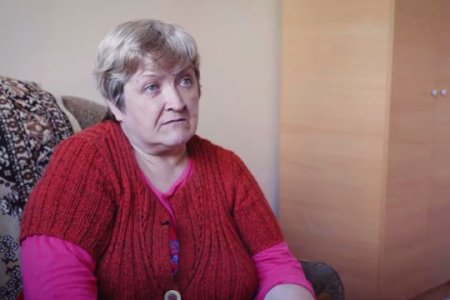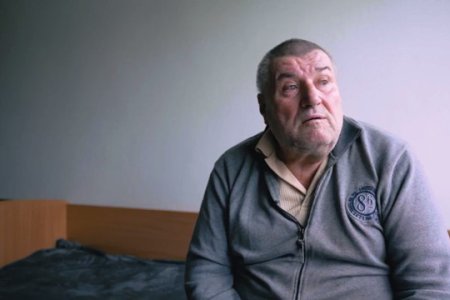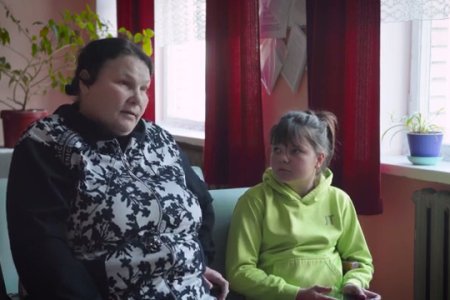At 15, I got a textbook with three letters — UPA [Ukrainian Insurgent Army]. I read it, and my vision of myself and the world changed dramatically. It changed because I realized we [Ukrainians] have our own army and history. I realized that we are a country with an ancient history, and our trident is one of the three most ancient symbols: mystical, esoteric, and the symbol of power.
I went to “Azov” at the end of 2014 — the beginning of 2015. I went because I saw that it was in “Azov” that there was a brotherhood. Plus, I had acquaintances there, with whom I became friends when, in 2012, I moved to the city of Mary — Mariupol. They called me and asked: “Rusya, how are you? We are already at war. Where are you? How are you? I said: “I’m in Western Ukraine, thinking about what to do.” Afterward, I came from Kamenetz-Podolsky to Kyiv, where I completed the KMB [course of a young fighter] in two weeks. The course usually lasts three months, but I finished it in two weeks. After that, I ended up in “Azov”.
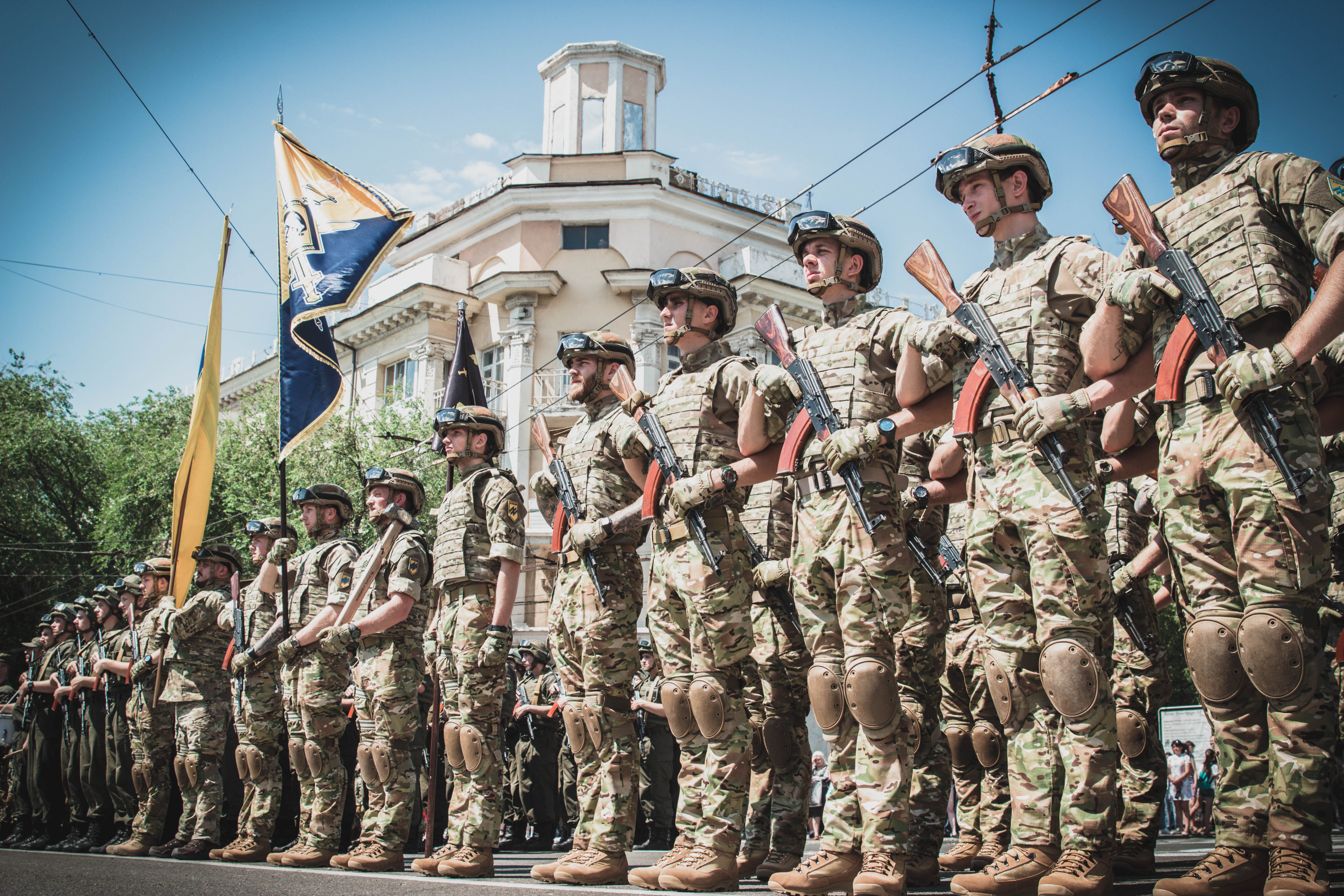
In “Azov”, I saw in people what I had read about in the UPA textbook: upbringing, dignity, honor — the so-called code. Many interesting people came to “Azov”: everyone had their personal stories. People didn’t go there due to circumstances but consciously went there. Firstly, nationalist and patriotic movements existed in Ukraine even before the UPA was created: Sloboda, Vilne Pole, and Free Cossacks. The Cossack spirit originated from the steppes. When I started talking to different people in “Azov”, they explained everything to me.
We had a kind of education; there was an office where you could come and talk about history: what is it, what does it have to do with us, why should we know it, why is it needed. All this was explained to us not to memorize dates and names, like in school.
All was explained to us so that a person would realize: who he is, where he was born, and what significance this land has for him.
After that, I realized what was happening in the so-called Donbas. Because Donbas is a Russian name, we didn’t have Donbas, but Sloboda, which was later divided into three regions: Luhansk, Donetsk, etc. Georgia is another vivid example because, in fact, it is Sakartvelo. Georgians don’t say: “We are from Georgia.” Russia similarly imposed this name.
At first, having no idea about the war [second world war], except from books and films, I did not realize how hard it was there. Then, when I read a book about the UPA, I thought about how our partisans, in small groups, went against entire battalions and laid them down in forests and fields. I began to wonder what inspired them to fight. And when I stayed at “Azov” for a year and a half, I realized what it was: this was brotherhood, which I now want to discuss. If your brothers see that you have some problems, they deal with them (of course, legally). Solve issues: psychological, physical, financial, and moral. They will help you, not hinder you, if you want to develop. And this is very important. Some people know how to tell you correctly and simply: “What is Ukraine? Who are the Ukrainians? I can’t even find words... You see, it’s such an atmosphere where we help each other when you’re at the base or in battle.
You look at all this and understand that you have to protect them, and they protect you. And together, we defend our country, its unity.
You are bursting with all this knowledge, and you want to go into battle again and again. It is not zombification, as they write about us, that we are “zombified Nazis”, or “terrorists” (everyone knows how many different cliches there were). Once people begin communicating with you, they understand that the stereotypes collapse; they don’t exist. They realize that perhaps you are more experienced in something they are not. And you explain to them: what it is, why you are going back there.
Then I began to choose other troops: I was interested, for example, in the National Guard (2018). Then I became attracted by the Armed Forces of Ukraine (I was a marine for three years). But, perhaps, the foundation laid by the “Azov” spirit, the “Azov” movement remained, and I found myself again in “Azov”. I knew that if a full-scale war began, I would return there. As you can see, I kept my word.
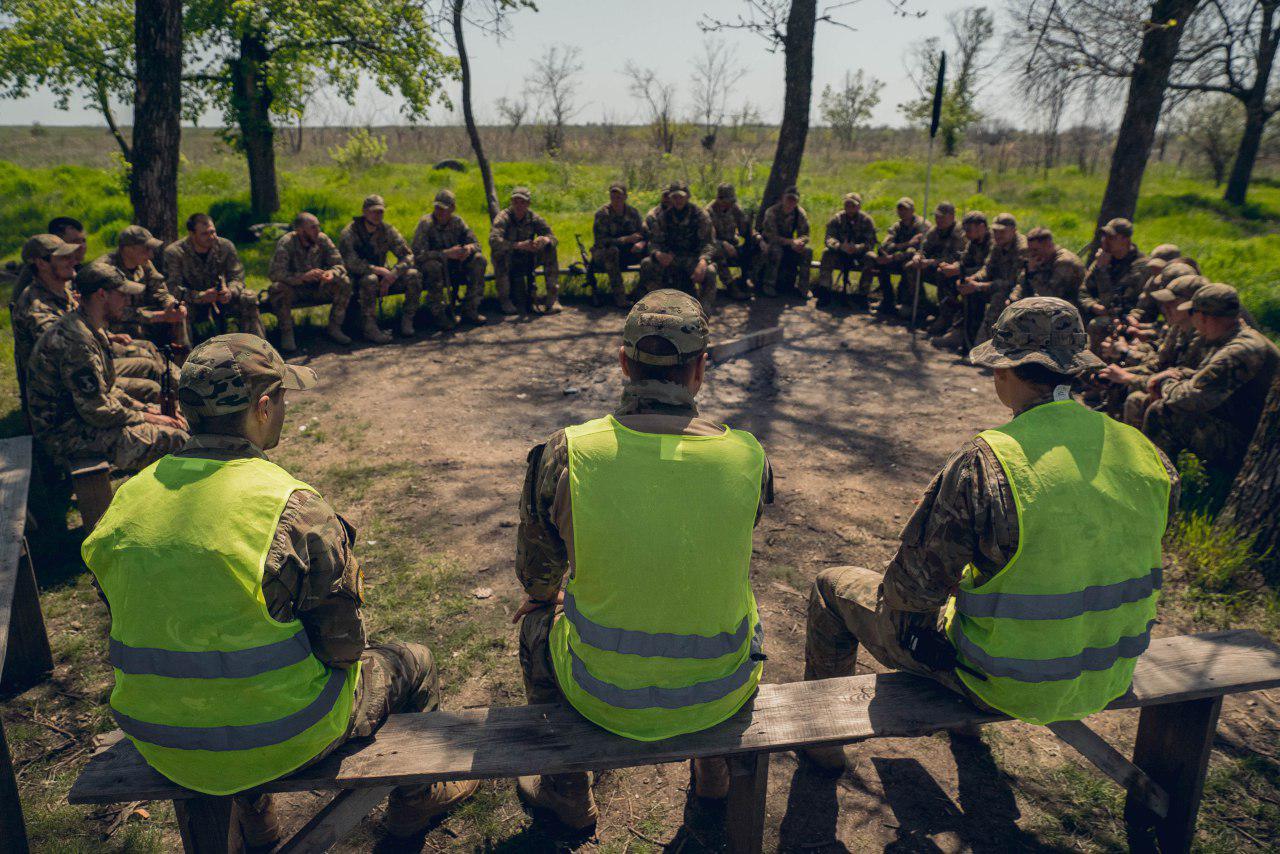
I went not because I am such a tough guy but because there is a team there; there are people you call brothers, not by blood, which is extremely important. You are friends with families, and this is not just a friendship between two people: there can be many of you, and you constantly communicate with each other. Again, I repeat, a lot of interesting people. People go to “Azov” consciously, but knowledge becomes even more significant over time. No one is born a patriot, and no one is born a warrior — all this is acquired during life. It’s like, for example, you want an apartment, a car, your own business — and you get all this. They don’t give you everything like: “Hold it, please.” And you’re like, “Great! Super!” It is different. It is acquired by arduous work on oneself, collective work, and, unfortunately, sometimes, blood. It is hard to develop such knowledge and understanding. Perhaps that is why I chose “Azov”.
Did the population of the Lugansk region support the occupation authorities in 2014?
In 2014, I ended up in the so-called occupation (there was no such word then); I saw how everything really happened. Everything was a little different. I believe the Lugansk region was poor; our miners often went on strike. My father was a miner, and I went with him to these strikes as a child. There was tea, cookies, bread, and some potatoes — that was all we ate there. We lived in tents for weeks. And you, the child, see it all. I only tried sausages at the age of 10. Seriously. It’s not that I was starving, but we had an impoverished region, and work exhausted people.
Education was available, but it wasn’t easy to get it: money was needed. So people didn’t care. The main thing is that they should not be bothered because after working at a factory (I worked at TSOF), a bakery, or a mine (I did not work in a mine), you no longer wanted anything. All you wanted was to have a beer, eat and go to bed. That was all your leisure time. You can talk about development if you drink cognac.
When white columns with the so-called “humanitarian aid” stopped by, some people did not support it, but these were by no means all people.
I constantly tried to explain that people from the Lugansk and Donetsk regions, the so-called Donbas, are not pro-Russian people.
There were a lot of adequate people who voluntarily went to fight for Ukraine. So many. When there was a campaign in the Donbas in 2014-15, it affected people like me. Even though I had no experience and did not know what an automatic machine was (I saw it only in games and books), I also went. Perhaps I went because the soul prompted: “You must go.” And my brothers said: “Oh, come to us, why not.” I asked: “Why Azov?” They told me: “Listen, you can’t even imagine, there is such an atmosphere here — we are all for each other.” I said, “Okay. I am in”.
Everything I said above is how I perceive things now. If I had to go through it again, I would agree again.
Were Russian actions against civilians in 2014 as brutal as they are now?
I believe it was precisely the same, but the area where the fighting occurred was smaller. And the phases of the war, when compared with a full-scale one, were also smaller. Everything was the same, but at a lower level, so to speak. Now it’s larger, more developed, something like that. Therefore, for me — the same, only the scale has increased. There was a case when I went to a bus stop in 2014, and they were shooting there. There were corpses there. They said they were Ukrainians. I already understood then how they could come here in a car. What kind of intelligence, if they had a well-oiled machine: they stopped by, shot civilians, and destroyed infrastructure. One car, but a whole army ...
What was 24 February like for you, and did you expect a full-scale invasion?
Since the end of 2017, I understood there should be a so-called logical conclusion. It cannot be limited because they [Russians] have grabbing hands. I understood that it was only a matter of time. The most interesting thing is that it was not only me who understood this: the “Azovites” understood and knew in the same way. Only I had my subjective idea, but they already knew.
And it [24 February] came into my life at five in the morning. I have been in Lviv for nine months. After the end of six years of action, contracts, and fighting, I decided to live a bit of civilian life. I studied to be an IT specialist and a software tester, and on 26 May, I was supposed to start working at SoftServe, here in Lviv. But on 24 February, I chose a slightly different company. It was a matter of hours.
I thought: “Bloody hell, I went there in 2014, and I had to leave without anything, and now it’s the same. But I knew I would go because there was no other way. I could not run away. Where, how, and why to run? It is my land, so why should I run away from my home for the second time? So after I left Donbas (or ran away), I answered the question: “Where do you live?” — “All Ukraine is my home,” because in fact and physically, it was like that.
After two hours of severe insomnia, I called a friend and asked: “Are you still here?” He said: “Yes, I’m waiting for the bus.” I answered: “Well, that’s it, I’ll be there too,” — and I made it on time, running through a good half of Lviv on foot. Again, this is the spirit of “Azov”: you call your friends and run because you understand that you are already there and with them.
What was your military path like?
I started in “Azov” with artillery. At first, I removed the caps from the fenders and screwed them into the projectile. And I also cleaned cartridges and shells; I was such a janitor. And then, I was promoted to the gunner, then to the senior gunner, and finally, I was the gun commander for almost a month while my gun commander was on vacation.
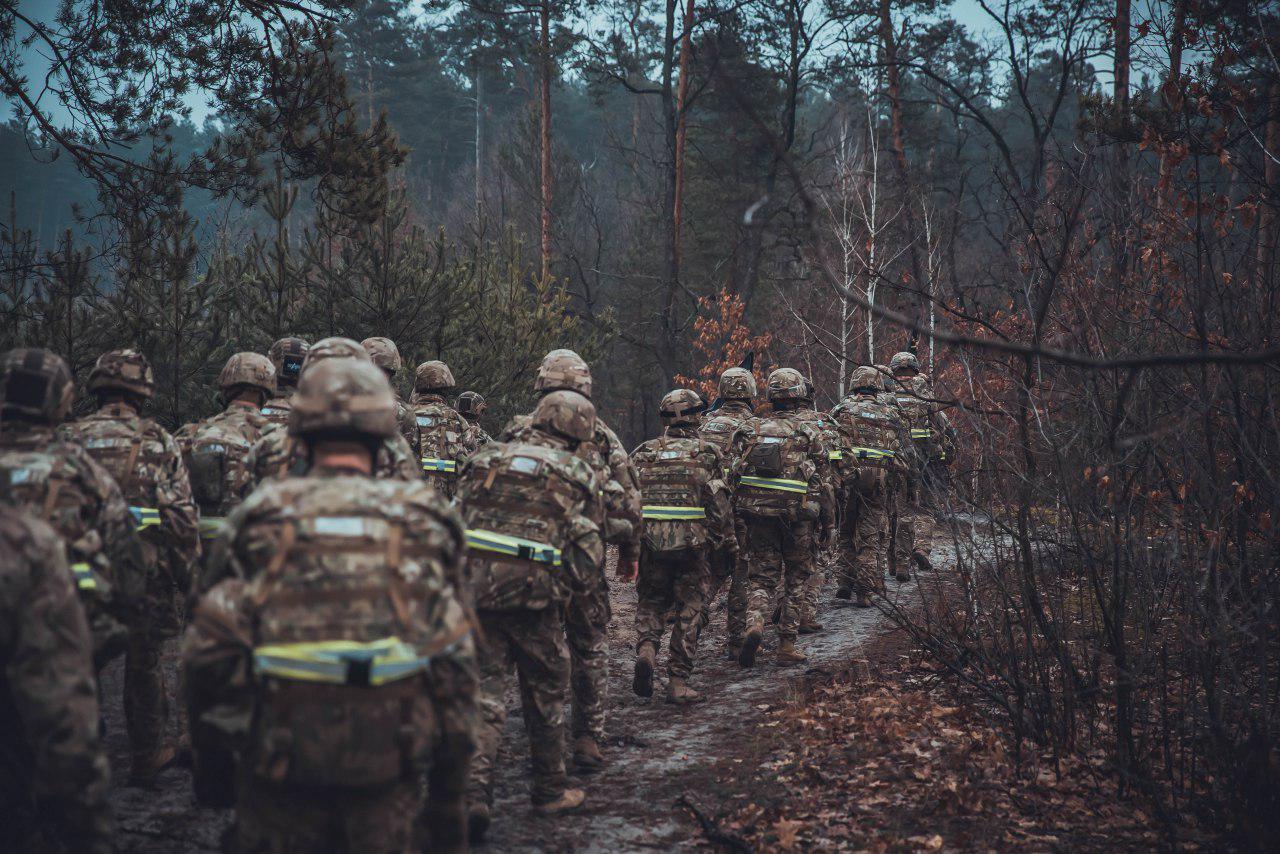
Then I changed my specialization because I decided to try a different military branch and, accordingly, another profession — I went into the infantry and became an ordinary infantryman. They gave me PKM [machine gun], which was interesting in a different way. And after that, I realized that it was essential now to study as much as possible: to understand how to work with it, what it is, and what it is for. So I began to learn new things slowly. I started shooting with an RPG [Rocket-propelled grenade ] (since I am a machine gunner). It became interesting to me — I went further. I am now a platoon leader.
Namely, in “Azov”, I started as an ordinary RPG officer. They asked: “Who can shoot?” I said, “Well, me.” — “And how many?” — I didn’t count. It happened a few times.” — “Can you?” — “I can.” — “You know?” — “I know. Let me try if no one else agrees.” Then we had our small team, up to ten of us there. Ranks changed very often: sometimes, the squad leader, deputy squad leader, and platoon commander. So I became a platoon leader.
When you are appointed to a position, they look to see if you have specific skills or talent. It is the same as snipers are chosen, how gunners become gunners, tankers become tankers, and so on. That is, all troops are essential when we cooperate.
There is no separate elite super-cool sniper, but there is this unity.
You can quickly become anyone: after the platoon commander, a grenade launcher, if necessary, and the case requires it. So we have a hierarchy, but there is no such thing as someone saying, I will not do this. If necessary, you must do it. But if it’s difficult for you, they will help you.
Why are the Russians destroying the civilian infrastructure of our country?
Well, if these are hospitals, it’s understandable: not to “repair” people and fighters so that the soldiers don’t go into battle again. Other infrastructure, for example, factories, is also understandable: so that there is no bread, clothes, or something else. I began to pay attention to schools, institutes, and other educational and historical institutions. When you pass them, you understand that everything was done purposefully. If the Russians were there, they tore all the textbooks and embroidered shirts [traditional Ukranian clothes] and broke pictures. It wasn’t a shell that got there, but a man. And this is very noticeable in the mess that they made. I believe they do it on purpose. People, not shells, destroy.

They are trying to change our history. How does a Ukrainian look in the films? Some kind of pot-bellied khokhol [ethnic slur for Ukranians], and he has dumplings, vodka, lard, and he wears sharovari [trousers, very wide at the hips, often gathered at the waist] — Hop-tsa-tsa! [Ukranian song] But, in fact, everything is entirely different. It’s not about lard and Hop-tsa-tsa or the music. There are so-called wedding songs or some other, and if you listen to them… They have images of Ukrainian men and women, but they are prostitutes and drunkards, and Russians constantly create such images. After all, this is education: you listen, and your brain perceives this is how it is. Here is such an image: khokhol, lard, vodka.
It’s the same with our schools...
They deliberately destroy it all, destroy it, burn it, no matter how. So it’s impossible not to notice.
Similarly, it is impossible not to notice that they immediately hang their flags when they enter Ukrainian schools. The building does not change, only its content changes.
I also noticed that they kill and eat dogs. Dogs (and all animals) are shot, or the bones lie around. So there is a question of their adequacy. There is such a person, Serhii Valeriovich, who is a cynologist (he has his own “Caucasian”, as he calls it) with Caucasian Shepherd Dogs. He made his amateur film. This film clearly shows how the Russians destroy everything, even animals. Well, what would this beast do to you? Everything is ruthless there, and there are scenes, I beg your pardon, like from horror films. Only this was here, in Ukraine. The film is called “War on Four Legs”; it was translated into English so that people living abroad understand that we have a full-scale war with an enemy without conscience, honor, or dignity. You know all this when you look at all photos and videos.
What does the end of the war mean to you?
To knock out the enemy from our territory is now the main task. We are now suffering greatly because of them (if I may say so). Firstly, I believe our final victory will be the return of our borders and lands. Secondly, the identification in our territories of all those who collaborated. So that later they do not begin to sprout like mushrooms after the rain inside the country. And the third is Ukrainization. But Ukrainization is not in the style of sharovarschina (Hop-tsa-tsa, lard, vodka, and a forelock [traditional Ukrainian Cossack hairstyle], twisted on the nose), but the way it should be. It must be intelligent. Firstly, people need to be shown what Ukraine is, as we were shown [told] in “Azov” about history. Also, about Ukraine as a whole, what it is, and who you are if you are a Ukrainian. The process should be composed and without pressure: we must create conditions when a person against Ukraine simply gets out, and that’s it. Then, I believe, there will be a final victory.
Plus, as I have already said and will say, unity is necessary because they have been trying to divide us and somehow succeeded for centuries.
From the point of view of war, this is very interesting — “Divide and Conquer”. Russians use it all the time. Therefore, we must make sure that they fail.
Do you hate Russians?
I wouldn’t say that I hate them. First, they came to my house, and I must kick them out (yes, we should do this). Second, I would not say that my brothers or I have some kind of hatred, for example: “Ah! I will torture and beat this Muscovite or katsap [ethnic slur for Russians].” No.
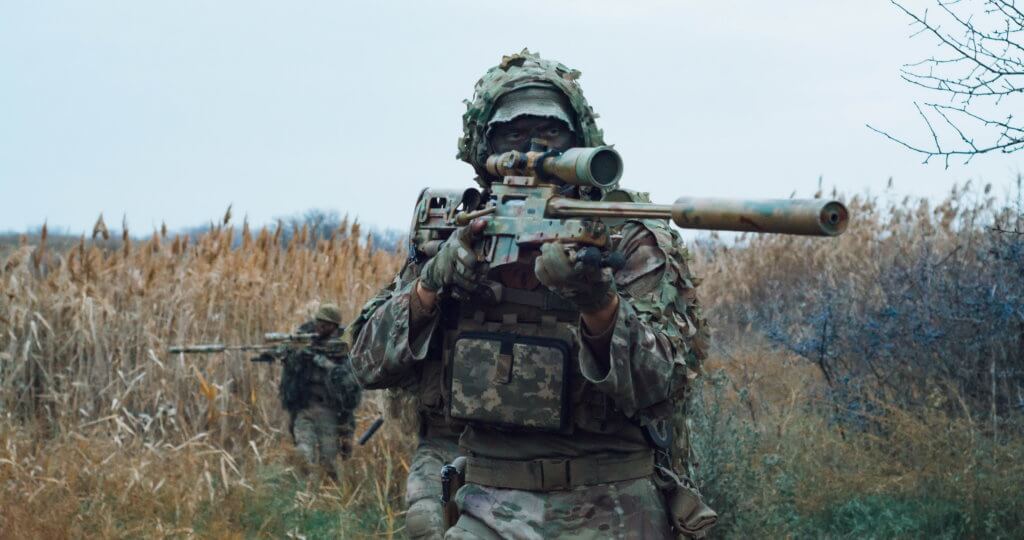
However, they are the enemy. What do we do with the enemy? We destroy them. Our coexistence is impossible, and we are not their brothers. I want us to never cross paths with them. Let them live in their swamps and steppes as they wish but without us. Build a border and create an alliance with those states that support us so that this does not happen again. Now Ukraine is an example of the struggle between good and evil. I think so because we, unlike them, are fewer. And Europe is now beginning to understand this. When there is a border through which they will not invade us, we can exist and develop normally. We (by our nature and culture) do not wish harm to anyone. We quarrel with each other and squabble, but then we make peace, sit down at the same table and resolve our issues. I believe that the only way and there is no coexistence. They do not need to be destroyed further but must be driven out of here, and the proper borders must be set.
Have you regretted at least once that you are an “Azovets”?
Never. Even the fighters who were in captivity do not regret this. On the contrary, they are even more proud of it, and I am proud of them. Those who were at Azovstal... For me, they are warriors. They are heroes. I think that compared to them, I’m nothing. Because in such inhuman conditions, you must be some kind of machine to withstand the enemy for so long while being cut off from the main forces! Not a kilometer, but the ten-kilometer behind, to hold back the enemy for so long without having any contact with the “mainland”. Therefore, I am proud of “Azov”. “Azov”, then and now especially, opened up to the whole world, and people saw who we are.
